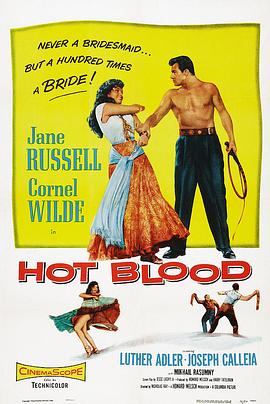If cinema were to vanish from existence, Nicholas Ray stands out as the figure most capable of resurrecting it anew, driven not just by ability but by an inherent desire. Envisioning John Ford as a naval commander or Robert Aldrich navigating Wall Street comes effortlessly, just as we see Anthony Mann tracking the elusive Belliou la Fumee or Raoul Walsh mirroring Henry Morgan's adventurous spirit beneath tropical skies. However, to picture Ray engaged in any pursuit other than filmmaking is near impossible. Directors like Logan or Tashlin might thrive in theater or vaudeville, Preminger as a literary mastermind, Brooks as an erudite educator, Fuller in the political arena, Cukor a virtuoso publicist – yet, for Nicholas Ray, cinema is not just a profession, it's his essence. A screenplay met with his disinterest retains superficiality, despite his innate talent and patent honesty, highlighting his moral commitment to directing as a primary calling.

On initial inspection, Hot Blood appears to embody this casual approach, though its underlying premise hints at greater potential. Reversing the narrative arc of The Lusty Men, or echoing Cukor’s Bhowani Junction, it presents a return to roots after a life of adventure. For those who, like me, consider D.H. Lawrence's The Plumed Serpent the paramount novel of the 20th century, it’s tempting to speculate how Ray, given the chance, could have seized upon a theme even more contemporarily resonant. But it seems his vision for Hot Blood was more of a playful detour between weightier projects. Shall we criticize him for this? Jean Renoir's Elena reminds us that轻松 endeavors can bear significant fruit. Thus, it's fair to chide Ray for treating this venture with too much levity.
Critics may dismiss Hot Blood as a mere commercial venture about gypsies,迫使Cornel Wilde into matrimony with Jane Russell, who forsakes his tribe only to realize her need for them. Yet, it’s not so straightforward. Nicholas Ray, known for engaging only in projects that resonate with him, saw in Hot Blood an opportunity to explore a theme dear to his heart – ethnic minorities – and to sketch a race through the lens of an individual, following Rossellini's footsteps while carving his unique path.
Each frame, slightly askew due to his adoption of CinemaScope, attests to Ray's lingering interest, dispelling any notion of his replacement by the likes of Raoul Walsh, suggested by Jane Russell's character, eerily reminiscent of Mamie in The Revolt of Mamie Stover. Despite a flawed execution, the plot bears Ray's signature, and Wilde's character echoes those portrayed by Sterling Hayden, Arthur Kennedy, and James Cagney in his earlier works. In every Ray film, the protagonist revisits a past they once deserted or disregarded, not seeking conquest but the harder road of reclaiming what was lost to immaturity or dissatisfaction.
One laments that Ray didn't delve deeper into a scenario teeming with potential, which could have elevated Hot Blood beyond mediocrity. Nonetheless, praise is due for his bold and meticulous use of vibrant hues – candy orange shirts, lime green dresses, purple automobiles, and pastel carpets – evoking the best of Van Dongen. This chromatic extravaganza dispels myths that cinematic color is better suited to the subtle than the vivid. Technical constraints of CinemaScope, demanding high contrast to achieve depth of field, further amplify this visual feast.
In conclusion, Hot Blood is a semi-triumph, mirroring Ray's semi-disinterest. Its success, paradoxically, arises almost in defiance of its director, or rather, through Ray's innate cinematic intuition, working subconsciously, less naively than the Surrealists' automatism. Nicholas Ray, the embodiment of cinema in its totality, invites a caveat: cinema alone may not encapsulate its entire breadth.
Translated adaptation by [Your Name Here]
 七弟电影
七弟电影
![韩国丧尸片《#活着/ALIVE》百度云网盘资源[HD-MP41.7GB][完整版][高清韩语中字]-七弟电影](https://gaga.pochou.com/wp-content/uploads/2020/06/活着-电影剧照-5-300x300.jpg)

